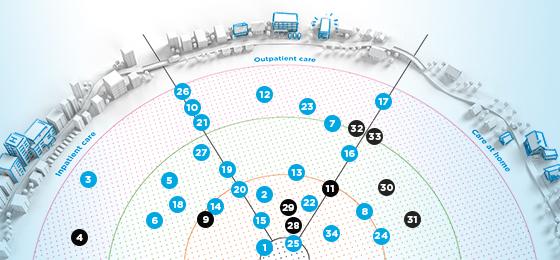10 research projects present their results

With the completion of those projects, the results of 26 research projects are now available.
The projects funded by NRP 74 started at two points in time (2017 and 2019) and last between two and five years. They finish at different times.
Overview of the ten recently completed projects:
Project 2: Participatory medicine
Participatory methods promote participatory decisions in colorectal cancer screening
In Switzerland, most primary care physicians prescribe only colonoscopy to test for colorectal cancer. Few offer their patients the choice of less invasive but also effective faecal occult blood tests. However, when physicians are trained in participatory medicine, they offer more choices to their patients, and thus improve screening rates for colorectal cancer.
More information on the study:
Project 3: Performance of elective interventions
Large regional differences in elective medical interventions in Switzerland
Elective medical interventions refer to operations that are non-vital. In Switzerland, there are sometimes large regional and temporal differences in the frequency of certain elective interventions and the surgical techniques chosen. These differences are probably often due to the attending physicians’ personal preferences.
More information on the study:
Project 8: Home treatment for acute mental illness
Treating people with acute mental illnesses at home
Over the past 30 years, the home treatment of patients with acute mental illnesses has raised many hopes and questions. The results of the Ticino study show that treatment at home is an effective, safe, feasible and cost‐effective alternative compared to standard inpatient treatment.
More information on the study:
Project 10: Merging of health data
Promoting the merging of health data in Switzerland
Linked health data provide an important basis for taking decisions on the continuing development of the Swiss health system. This project has developed proposals on how the existing data from the out- and in-patient setting, from research and the insurance sector can be merged.
More information on the study:
Project 15: Provision of care for children with developmental disorders
Better care for children with developmental disorders
Little is known in Switzerland about the availability of, demand for and efficacy of the care provided for children with developmental disorders and disabilities in the first years of life. To fill this gap, data from a central register in the canton of Zurich were analysed.
More information on the study:
Project 20: Spiritual dimension of pain therapy
Successful integration of the spiritual dimension into chronic pain therapy
Attention to the spiritual dimension in interprofessional therapy can contribute to more satisfactory care of patients with chronic pain. The study generated a basis for this approach and tools for interprofessional training and clinical practice.
More information on the study:
Project 22: Electronic decision-making assistants
Improved medication for the chronically ill with an electronic decision support system
Patients with multiple chronic illnesses often use potentially inappropriate medications. This study examined how an electronic decision support system designed for general practitioners (GPs) can improve prescribing appropriateness and patient quality of life.
More information on the study:
Project 27: Nurse-led care model
Nurse-led care models reduce unplanned hospital admissions
Nurses, physicians and those concerned jointly developed and tested a nurse-led care model for people in nursing homes with the aim of reducing the number of unnecessary hospitalisations. The new model used specifically trained nursing professionals to improve the medical and nursing care provided.
More information on the study:
Project 33: Impact of health policy decisions for patients
Chronically ill people need well-developed primary care, as a simulation model shows
How can health care in Switzerland be optimally tailored to meet the needs of chronically ill people? The study models the consequences of health policy decisions on the patient care in four scenarios.
More information on the study:
Project 34: Medication management
A collaborative, patient-centered medication management model to promote home-dwelling older adults’ safety at home
Taking several medications at the same time can lead to adverse effects and dangerous situations for home-dwelling older adults with chronic conditions. The study investigated how medication management can be made safer for this patient group and an interprofessional model for safe medication management was developed.
More information on the study:
